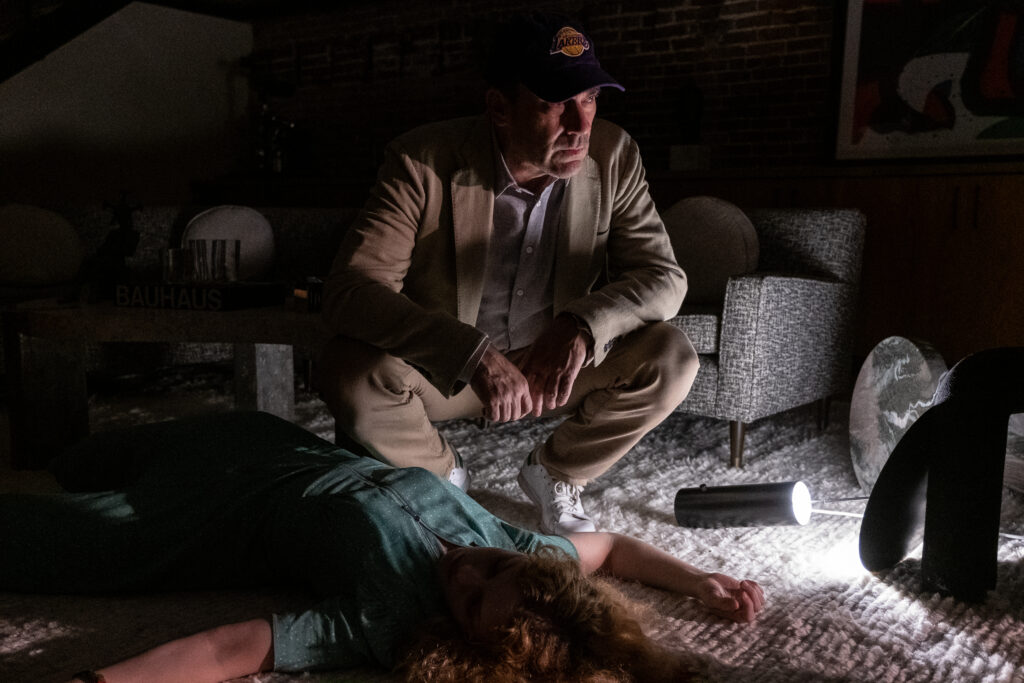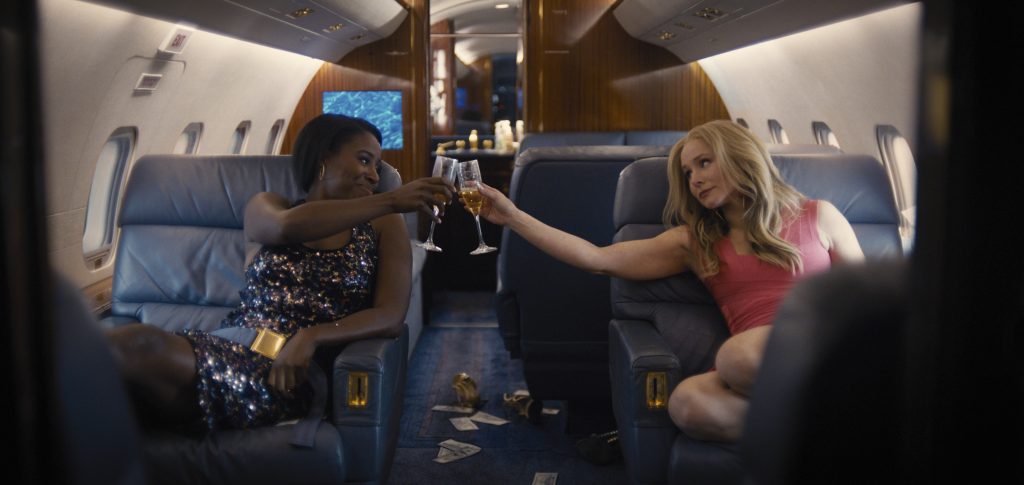July 6, 2023
by Carla Hay

Directed by Adele Lim
Some language in Mandarin and Korean with subtitles
Culture Representation: Taking place in the United States, China, South Korea and France, the comedy film “Joy Ride” features a predominantly Asian cast of characters (with some white people and African Americans) representing the working-class, middle-class and wealthy.
Culture Clash: Four Asian American women in their late 20s have misadventures in China, where one of the women is on a business trip and tries to find her birth mother.
Culture Audience: “Joy Ride” will appeal primarily to people who can tolerate raunchy comedies about the ups and downs of friendships.

“Joy Ride” earns its reputation for being a movie for “mature audiences only.” Some of the fantasy elements of this comedy don’t work very well, but the snappy dialogue and the chemistry between the cast members make “Joy Ride” highly entertaining to watch. The movie recycles some elements from other comedy films about friends on a misadventurous trip, such as 2009’s “The Hangover,” 2011’s “Bridesmaids” and 2017’s “Girls Trip.” However, “Joy Ride” has plenty of originality on its own, including a story told from an Asian American female perspective.
Directed by Adele Lim, “Joy Ride” was written by Cherry Chevapravatdumrong and Teresa Hsiao. Lim, Chevapravatdumrong and Hsiao are also three of the producers of “Joy Ride,” which had its world premiere at the 2023 SXSW Film & TV Festival. There’s a lot of authenticity in “Joy Ride” that has to do with the fact that Asian American women are principal leaders on the creative team in this movie that is centered on Asian American women. All four of the main characters in “Joy Ride” are fully formed human beings and not hollow stereotypes, although there are some clichés in certain situations that are played for laughs.
Too often, Asian women are stereotyped in movies as subservient or tragic figures. “Joy Ride” is a giant and defiant middle finger to those stereotypes. At its core, “Joy Ride” (which is Lim’s feature-film directorial debut) is about true friendship, honesty, and being comfortable with one’s own identity. “Joy Ride” is far from being preachy, but it does offer some meaningful life lessons amid all the vulgarity and extreme comedy.
The beginning of “Joy Ride” shows how the friendship started between the two characters whose relationship gets the most screen time in the movie: Audrey Sullivan and Lolo Chen. They both met when they were 5 years old. Audrey’s family moved to the town of White Hills, Washington (a Seattle suburb), where Lolo and her family live have lived for a number of years. (Lennon Yee has the role Audrey at age 5, while Belle Zhang has the role of Lolo at age 5.) Audrey and Lolo are each the only child of their parents.
Audrey was adopted as a baby from China by a white married couple named Mary Sullivan (played by Annie Mumolo) and Joe Sullivan (played by David Denman), who are loving and attentive but not completely in touch with giving Audrey enough exposure to her Asian heritage. Audrey has lived in predominantly white areas her entire life. Lolo’s parents are Jenny Chen (played by Debbie Fan) and Wey Chen (played by Kenneth Liu), who are Chinese immigrants who own and operate a Chinese-food restaurant.
When they meet at 5 years old, Audrey is obedient and shy. Lolo is rebellious and outspoken. During Audrey’s first day at her new school, she is bullied by some white boys for being Asian. Lolo’s reaction is to punch the boy who is the cruelest to Audrey. It sets the tone for the friendship between Audrey and Lolo, who are the only Asian girls in their neighbhorhood. (In flashbacks, Isla Rose Hall has the role Audrey at age 12, while Chloe Pun has the role of Lolo at age 12.)
Audrey and Lolo are so close, they have a sisterly friendship. Their personalities stay the same into adulthood, except Audrey becomes more confident as an adult. The majority of “Joy Ride” shows Audrey (played by Ashley Park) and Lolo (played by Sherry Cola) when they are both 29 years old.
Audrey has grown up to be a responsible and successful corporate attorney at a law firm where she is the only Asian attorney. The movie makes a point of showing that almost every attorney at the firm is a white man. Audrey, who is accustomed to being around mostly white people, does what she can to fit in at this male-dominated law firm, including playing tennis with her male colleagues.
Lolo is a struggling artist whose specialty is making kitschy erotic art. For example, one of her art displays is a plastic recreation of her playground from her childhood, but with things such as a penis-shaped slide. An illustration she has made of a flower is supposed to resemble a vagina. It’s mentioned several times in the movie that Lolo is a sexually fluid “free spirit” who indulges in drugs and believes in having an unrestricted “sex-positive” lifestyle.
Audrey is under pressure because she is about to go on a business trip to Beijing, China, where she is expected to close a deal with an important potential client, who is a wealthy Chinese businessman named Chao Lin. If she closes this deal, it could mean a possible promotion for Audrey, who wants to become a partner in this law firm. Audrey’s boss Frank (played by Timothy Simons) is casually condescending in his racial attitudes and goes overboard in trying to appear like he’s politically “woke,” even though it’s obvious he dislikes everything that has to do with being politically correct.
Audrey’s boss and her other colleagues expect Audrey to have some kind of special advantage in closing the deal, just because she is Asian. Audrey doesn’t know how to speak Mandarin, but she pretends that she does because she wants the people at her law firm to think that she’s well-educated about China and in touch with her Chinese roots. “Joy Ride” has constant themes about how pretending to be someone you’re not can ending up backfiring in damaging ways.
Audrey and Lolo decide to go on this business trip together, partially because Lolo can speak Mandarin, and partially because Lolo just wants to get away from her life in the U.S. for a while. Lolo plans to visit family members in China. Lolo also says that she plans to hook up with basketball star Baron Davis (playing a version of himself), who will be in Beijing at the same time because he’s playing for a Chinese basketball team. Lolo is addicted to social media and does a lot of livestreaming throughout the trip.
Even though Audrey insists that this trip is mainly going to be business for her, there would be no “Joy Ride” movie if that turned out to be true. Audrey also has plans to visit her college best friend/roommate Katherine, nicknamed Kat (played by Stephanie Hsu), a Chinese American who has become a famous movie/TV actress in China. Throughout the movie, Lolo and Kat have a rivalry where they try to prove who is Audrey’s “real” best friend. It’s very reminiscent of the friendship rivalries that were in “Bridesmaids” and “Girls Trip.”
One person whom Audrey does not want to visit in China is her biological/birth mother, who was an unwed teenager when she gave Audrey up for adoption. The only thing that Audrey has of her mother is a photo of her mother holding Audrey as a newborn baby. Lolo can read Mandarin and notices that the back of the photo has the name of the adoption agency and the name of Audrey’s birth mother.
Before leaving for the trip, Lolo offered to go with Audrey to the adoption agency in China to try to find Audrey’s birth mother. It’s an offer that Audrey declined because Audrey says she’s happy with her adoptive parents and doesn’t want any more parents. Lolo is surprised and disappointed, because when they were children, Audrey used to talk a lot about the two of them going to China to find Audrey’s birth mother.
Lolo waits until she and Audrey are at the airport to tell her that someone else is going with them on this trip: Lolo’s socially awkward and eccentric cousin Deadeye (played by Sabrina Wu), who is androgynous, childlike, and obsessed with K-pop music. (In real life, Wu is non-binary and uses they/them pronouns.) Later in the movie, Deadeye reveals that her real name is Vanessa. Audrey, who has a tendency to be elitist, is temporarily upset by Deadeye going on this trip because she doesn’t want Deadeye to be a social burden.
Upon arriving in China, one of the first things that Audrey, Lolo and Deadeye do is visit Kat while she’s working on her soap opera TV series called “The Emperor’s Daughter.” Kat is the star of the show. And she’s engaged to her leading man: a tall and handsome actor named Clarence (played Desmond Chiam), who is originally from Australia. Clarence (who is a strict Christian) and Kat have been dating each other for three years.
One of the biggest comedy gags in “Joy Ride” is that Kat has a wild past that she has not revealed to religious Clarence, who doesn’t believe in having sex outside of marriage. Kat has been pretending to have the same religious beliefs as Clarence, who insists that they abstain from having sexual intercourse or any other intimate sexual activity with each other until they are married. Audrey knows about Kat’s past promiscuity but is keeping it a secret from Clarence because it’s not Audrey’s place to tell him. Clarence and Kat are very affectionate with each other, but their affection doesn’t go past passionate kissing.
Not surprisingly, there are immediate conflicts between Lolo and Kat, in their competition to outdo each other as “Audrey’s best friend.” Lolo doesn’t respect Kat because she thinks Kat is a phony. Kat doesn’t respect Lolo because she think Lolo is a failed artist. The sniping between these two women is one of the many problems that occur during this trip. Audrey doesn’t do anything to pit Lolo and Kat against each other, but Audrey doesn’t adequately deal with this rivalry problem either.
Audrey’s first meeting with Chao Lin, also known as Mr. Chao (played by Ronny Chieng), takes place at a nightclub. Because of this casual setting, Audrey has also invited Lolo, Kat and Deadeye to go to the nightclub with her. Audrey also needs Lolo and Kat there because they can speak Mandarin. Audrey has been told in advance that Mr. Chao will only speak in Mandarin to her. It turns out he actually knows English and was just testing Audrey.
Of course, this nightclub meeting is the start of even more problems. Mr. Chao and his all-male group of colleagues insist that anyone they do business with has to partake in their business customs, which includes binge drinking. Audrey feels obliged to go along. (And you know what that means in a comedy where a drunk person inevitably gets sick.) Lolo, Kat and Deadeye also join in on this binge drinking.
Mr. Chao knows that Audrey was adopted by white American parents, but he expects Audrey to know who her biological family is, in order for him to agree to the deal. “If you don’t know where you come from,” he says to Audrey, “how do you know where you’re going?” Lolo spontaneously lies and tells Mr. Chao that Audrey keeps in touch with Audrey’s birth mother. Mr. Chao then insists that Audrey’s birth mother and Audrey go to a party that Mr. Chao will be having in the near future.
Audrey is angry at Lolo for blurting out the lie to Mr. Chao, because finding Audrey’s birth mother will take time away from the other things that Audrey wanted to do on this trip. It won’t be the last time that Lolo’s impulsiveness causes some issues in this group. Caught in a lie, Audrey and her three companions then go on a quest to find Audrey’s birth mother, with the hope that the reunion will go well and that Audrey’s birth mother will want to go to the party. (It’s a lot to expect, but stranger things have happened in real life.)
Along the way, the quartet will get caught up in some wacky situations, including being stuck in a train car with a drug dealer named Jess (played by Meredith Hagner), right at the moment that the train security staffers are patrolling the aisles and will soon arrive at their train car to search their luggage for drugs, weapons or other contraband. Part of the comedy is that Audrey is so sheltered, she doesn’t figure out until it’s too late that Jess is a drug dealer, because Jess appears to be an innocent-looking young American woman. A quick plan is put into action that is exactly what you think it might be, in order to hide the drugs that Jess brought on the train.
The four travelers also visit Lolo’s large group of relatives who are all gathered in one house, for a family reunion. This clan also includes (cliché alert) a feisty grandmother named Nei Nei Chen (played by Lori Tan Chinn), who’s not afraid of giving her unfiltered opinions. Three of the four women also have separate sexual encounters with men on Baron’s basketball team, including Baron; Todd (played by Alexander Hodge), who knows Kat from a previous encounter; and Kenny (played by Chris Pang) and Arvind (played by Rohain Arora), who meet Audrey at a hotel bar.
“Joy Ride” doesn’t shy away from jokes and commentary about race relations, white supremacist racism and the prejudices that Asian people have against each other. In an airport scene, Deadeye gives a judgmental rundown of ethnic stereotypes, based on the travelers being from Taiwan, Hong Kong, South Korea or Japan. The movie also shows how some Chinese people are prejudiced aganst Koreans because they think that Koreans ar a lower class of Asian people than Chinese people.
Audrey has some self-esteem issues related to her racial identity because, as she says at one point in the movie, she’s not white enough to fit in with white people and she’s not Asian enough to fit in with Asian people. Deadeye was bullied as a child and still struggles with finding people who fully accept her. It’s mentioned several times in the movie that most of Deadeye’s “friends” are people she only knows through online activities.
The movie has a few dream-like sequences that are whimsical but don’t really fit the harder edges of this comedy. One of these sequences is styled like a music video, when Audrey, Lolo, Kat and Deadeye pretend to be new K-pop stars, in order to board a private jet to South Korea without passports. Because, yes, “Joy Ride” has the travel comedy cliché of stolen luggage and stolen passports.
“Joy Ride” has a few surprises, including something that one of the women finds out, which leads to a sentimental, tearjerking moment in the film. Some viewers might expect “Joy Ride” to be all raunchy fun, but the movie handles this balance of zany comedy and serious drama in a mostly skillful way. The temporary shifts in the movie’s tone bring “Joy Ride” back down to earth to show that these four women are not caricatures for the sake of comedy.
Because “Joy Ride” has a lot to do with the friendship between Audrey and Lolo, the cast members who get to show the most emotional range in the movie are Park and Cola. Park in particular rises to the occasion by adeptly portraying all aspects of these emotions. Cola also does quite well in her role as Lolo, although the movie could have done a little more to show more of Lolo’s life that doesn’t involve her friendship with Audrey.
Hsu is hilarious as pampered diva actress Kat, who is fixated on what other people think about her. Wu also has moments to shine in scenes where Deadeye starts to come out of her introverted shell. Of the supporting cast members in “Joy Ride,” Chiam stands out with some very good comedic timing in portraying Kat’s hunky and pious fiancé Clarence, who upends the stereotype that physically attractive and famous actors are sex-crazed cheaters.
Even though “Joy Ride” uses many of the same formulas that are found in other travel comedy films, there are so many other things about the movie that are rarely seen in American-made comedy films. “Joy Ride” director Lim (who wrote the 2018 smash hit “Crazy Rich Asians”) gives a brisk and lively pace to the movie, even though some viewers might think that too much is crammed into the short trip that’s depicted in “Joy Ride.” Parts of “Joy Ride” do seem overstuffed, but what’s in the movie overall is worth unpacking.
Lionsgate will release “Joy Ride” in U.S. cinemas on July 7, 2023.






